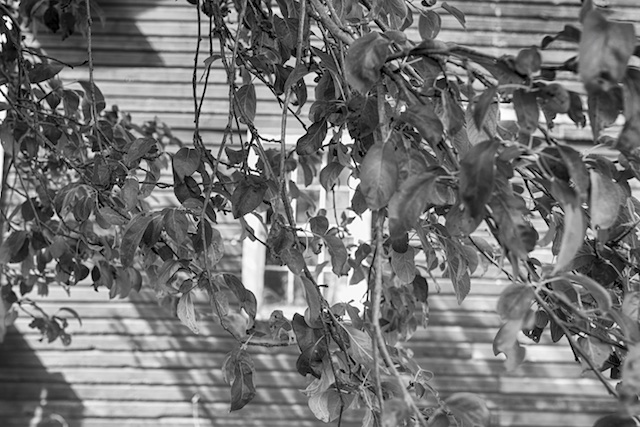
Our big barn is old, and the windows have great character. Doors and windows are symbols to me, of gateways and choices, they are important.
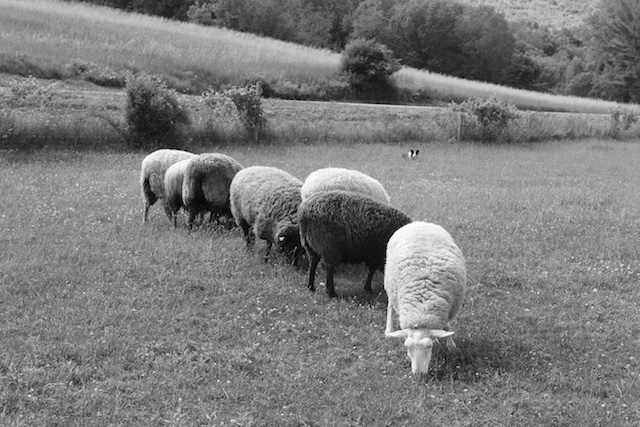
I love watching Red when he’s on duty, he is solid as a rock, undistractable, incorruptible. You could drop a steak on the ground next to him and he wouldn’t touch it if there were sheep anywhere around. His little sister Fate, on the other hand, is distracted by anything and everything and would leave the sheep in a second to snuggle, greet a visitor or get any kind of treat.
Red would happily sit right in that spot all day if I left him, there, and if I did, he and the sheep would be right where I left him.
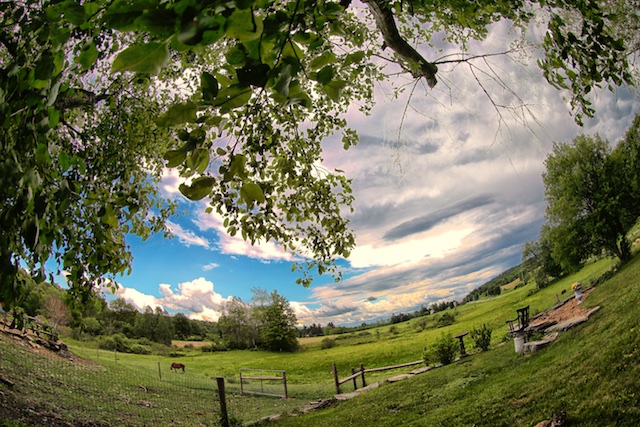
The word spread through town mid-afternoon, some heavy weather is on the way, a cold front with hail, rain, high winds. Tomorrow, cold and stormy. Put the things that might blow around away. We were in town hanging up posters for the Open House on June 25-26, just a few weeks away.
We let the animals out to graze and looked up and we saw the storm blowing in from the West, it came sailing right over the hills, pushing the blue skies away, the temperature dropped, the wind picked up. More rain, we said, good for the grass, the crops and the flowers. But it did look kind of heavy. We are putting the things away that need to be put away.
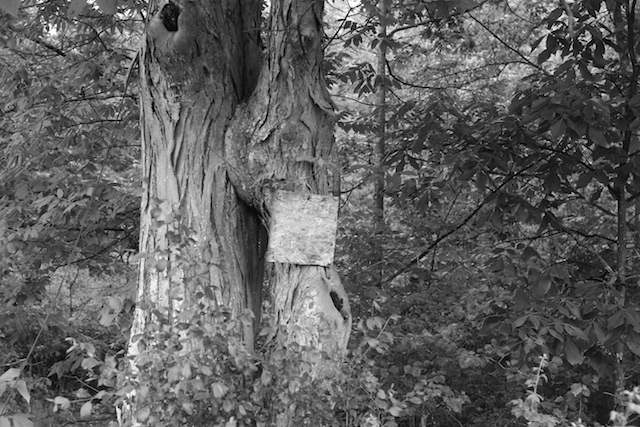
Since World War II, writes Wendell Berry, the governing agricultural doctrine in government offices, universities, and corporations has been that there are too many people on the farm, too few in rural America. Rural life has been abandoned in favor of the new global economy.
Berry is correct.
One of the great and most consequential migrations in human history has been tens of millions of rural people moving from country to city in a stream, then a tidal wave. Towns and villages have emptied out, jobs have fled, development has decreased, government has lost interest and, as significantly, a way of life is vanishing.
People struggle to make a living here. There are just not enough customers to sustain too many things.
Every day I get letters in my Post Office Box (P.O. Box 205, Cambridge, N.Y., 12816) from people remembering their lives on the farms, the chickens walking around, a pet cow, mother and father out in the fields, a fierce sense of community, values of thrift, help for friends and neighbors, hard work.
They like to read my blog, they say, it reminds them of the other life. The kids write me as well, many hope to return to the country one day, they love seeing photographs of it.
In a sense people in rural communities are victims, but you will rarely hear them whine or complain about their lives.
People in rural areas rarely steal things, lock their doors, helicopter-parent their kids. They drink too much, smoke too much, drive too fast.
In rural life, people once had callings, not jobs. Kids look for jobs and walk to school and back, they take their goats and cows to 4-H clubs and county fairs and sleep next to them all week.
People stayed on farms because they loved farms, despite the grueling work and hours. People were farriers, shearers, woodsmen, carpenters, tradesmen, blacksmiths. They chose work they loved for people who cared about them. It was never an easy life, but it was often a meaningful life.
I don’t care to romanticize rural life, it is often difficult and can feel small-minded, petty, even incestuous. It’s hard to find the food you want, or see the latest movie. People resist change, they are wary of it . The Internet brings the world closer when it seems far away. Once in awhile, I need to get to a city and soak up some energy.
Everybody minds their own business but everybody also know’s everybody’s business. Once this would have bothered me greatly, but now, I like to be known. And I am, if I forget my wallet or don’t have enough money, the answer is always the same: “we know where you live.” When there is trouble – an animal dies, a tree falls on a fence, the pump to the well shorts out, the big men in trucks come running.
They are the First Responders of rural life, and they are always eager to help. Being a neighbor still means something, we may or may not like each other, but we need to get along.
When there is serious trouble – an illness or a death – then everybody comes running, male and female, the yard fills with cars and trucks and people bringing food and love. I never feel alone here.
I am a creature of urban life – I grew up in Providence, R.I., and lived in Baltimore, New York City, Dallas, Washington and Boston. and suburban New Jersey. I could never go back, it seems that nobody ever does.
I feel as if Cambridge, N.Y. and the countryside is my home. I find the country to be healthy for me, and for others. Scientists say the brain is hard-wired for the peacefulness of rural life. . I like looking at beautiful things, I love the sense of space. I love big cities, but I can’t handle them for too long.
Too crowded, too noisy, too disconnected from one another.
I was struck in the early days of the Craig Mosher story in Vermont how many anguished Vermonters send me messages saying the indictment of their neighbor violated “Vermont values.” I wrote back to some of them and asked them what those values were.
“We don’t sue each other,” one man said. “We are always there for our neighbors,” said another. “In rural life, accidents happen, all the time, cows are always out on the road. You don’t go to jail for that, you go and help them out.” In Vermont, said another “we know the difference between pets and animals, we know what it is like to farm, we understand rural life.”
In a curious sense, the aftermath of Hurricane Irene embodied the very idea of Vermont Values. People did not want for government relief or handouts or guardsmen or outside contractors. Just across the border, in New York State, people waited weeks to be dug out and get some help.
We know who one another’s kids are, if their bikes get a flat or they are getting soaked in a storm, it’s okay to give them a lift home. They know who we are. They know where we live.
In Vermont, everybody got into their tractors and trucks and went to work, clearing out roads, changing riverbeds, rescuing one another, getting the elderly their medicine. It was one of the great civic rescue operations in American history. Yet Vermont is also a culture divided, half of the state belongs to out-of-towners with different values and sensibilities. Sometimes they class, and perhaps that reality underlies the Mosher case.
The couple that hit the bull was from Connecticut and only lived in Vermont part-time. People whisper that Vermonters would never get one another arrested, unless it was for murder. It’s just what they say.
Everywhere, and not just in Vermont, people in rural areas feel that they are under siege. Their children almost all go off to cities to work in jobs they hate for people who care nothing for them. Some of the old farmers go off to Florida to retire when their knees give out. Word is, they don’t last long down there with no cows to milk or fields to plow.
There is no one left to help the old-timers work on the farms, the term family farm is losing its meaning. Even if they could keep up with the giant corporate monoliths taking over food production and agriculture, time is running out for them.
Rural life is precious to me, we are close to nature here, beautiful things are all around us, we can still live and work with and around animals, we can get to know them as people have known animals for many thousands of years. Our dogs can run free and even go to the dentist with us, when my dog was lame, the vet stopped over to take a look at him running.
The winters are harsh, they have meaning. The Springs are eternally beautiful. Old people hang on to their houses, there is always someone to help. To me, life seems more natural, less artificial. In the cities, people are piled on top of one another, but nobody seems to feel known.
I believe my creativity is enmeshed with where I live, I am inspired by the beauty and life and space all around me. I feel I am giving voice to people and a life that has been forgotten by the rich and the powerful who run the country. I am surrounded by good and honest and plain-speaking people.
My dogs have never walked on leashes, they can come to the dentist with me or go to the bookstore here. Nobody in my town will break a car window if a dog is inside they think it’s warm. They might roll the windows down a bit.
This morning, Ed Watkins, who painted out house, came by to reassure me that he would bring over the cord of wood he promised, and that he owes me. “I’m not worried,” I said, “we know where you lived.” And Wally Cordell the plumber called to check on our well pump, which sounds funny. He is coming out in the morning.
“We live just north of Cambridge,” I said.
“I know where you live,” he said, “that’s Florence Walrath’s old place. You have the donkeys and the sheep there. I drive by all the time.”
I know that this way of life is dying, we all too. We don’t talk about it much, we just shake our heads at the news, at the cost of living in the city, at the complications and stress of life beyond our forgotten borders.
But everybody knows where I live. I live in Florence Walrath’s old place.
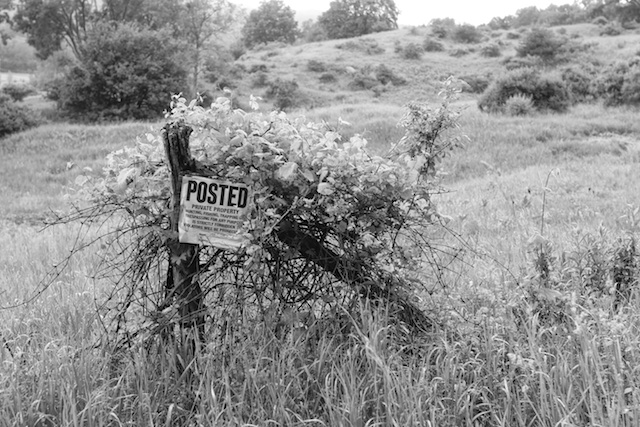
Some years ago, when I worked in the tense and grinding world of television news in New York City, I began to unravel. I went to see an analyst and she prescribed valium for my fear, which kept me from sleeping. I took valium for 30 years, became addicted to it, and then stopped taking it about five years ago.
Today, I do not sleep well but I live with little anxiety or fear. For much of my life, I was also often in conflict. I had troubles with bosses, with colleagues, with employees, in my marriage, with my friends. I quit jobs and moved, sometimes twice in a year. Conflict seemed so natural to me I didn’t think about it much.
I do think about it now, and there is very little of it in my life.
My marriage is quite wonderful, I have good and trusted friends, work that nourishes me and does not deplete me. It is a stunning idea to me still that things like fear and conflict are at least somewhat a choice, not a curse or act of fate.
This week, I have been writing about the Craig Mosher case in Vermont, it has attracted a lot of attention among farmers and animal lovers. The tragedy of this story is that it forces us to start making choices about what is right and what is wrong. We can’t really hide behind the left and the right.
The Mosher case is a complex case, and there are very definitely two sides to it. Both are powerful – the history and future of the human-animal bond versus responsibility for an accident that took the life of a human being. Heavy stuff.
In many cases – the Joshua Rockwood case in Glenville, N.Y., last year, I had no difficulty reaching my own judgement after I went to see Joshua, meet him and toured his farm. I could not find two sides. He was unjustly accused of cruelty to his animals when his only crime was to be nearly overwhelmed by an awful winter.
Sometimes, things just strike me as right or wrong.
I also have defended a number other farmers who I believe were cruelly and unjustly accused by ambitious prosecutors and an animal rights movement that no longer helps animals much, but is harming many people. I am not conflicted about it, I see it clearly and feel it strongly, and it well is documented for those who wish to see it.
I believe in facts, not arguments, and I believe in instincts, not emotion. They are different things.
I learned in recent years that both fear and conflict are geographies, spaces to cross. I could train myself to make different choices about them and change the geography of my own emotions.
Both fear and conflict seem natural to many human beings, say neurologists, they are believed to be related to the left-right brain functions now under so much study. People are instinctively oppositional, that is why there are so many wars, so much conflict.
Oppositional thinking for example – the impulse to judge and be in conflict, so prevalent in our political and social media cultures – is believed by many psychologists to be a condition, a function of the brain. In fact oppositional thinking is often called the “condition of conflict.”
When a politician makes a statement or takes a position in our contemporary culture, there is no contemplation, discussion, mediation or negotiation. There is instant opposition and conflict, both on the “left” and the “right.” Every facet of political discourse becomes an argument, not a proposal or discussion or common understanding. I came to understand this as unhealthy, for me, and for the wider world.
Arguments create stress and anger, they are uncomfortable and disturbing. They often lead to religious conflicts and wars, stale-mated political systems.
New technologies like social media promote conflict, and also spread fear. Our politics are no based on oppositional thinking. Negotiation and compromise are considered moral failures,even treasonous.
They are not soothing or calming, they claim to connect us, but more and more, they seem to be connecting our fear and anger, not our sense of common purpose and community. Of course, many people use social media to find hope and meaning.
I work on that. “For someone who struggles to stay positive in what often seems like an unrelentingly negative world, you are often the kick-in-the-pants I need,” wrote Ann after she initiated a voluntary payment for the blog this morning. This is good to hear, it is somewhat the point and purpose of the blog.
Pope Francis has written eloquently about this pervasive sense of conflict, fear and pessimism. The social dimensions of global change, he writes, include the effects of globalism on employment, social exclusion, a sense of alienation and victimization, an inequitable distribution of energy, social break down, increased violence and new forms of social aggression. Some of these signs, he believes, are also symptomatic of real social decline, the rupture of the bonds of integration and social cohesion.
Furthermore, he writes, when media and the digital world become omnipresent, their influence can stop people from learning how to live wisely, to think deeply and to love generously. The great sages and historians go unheard amidst the new overload of fear and conflict.
I am flooded with messages this week thanking me for seeking balance in writing about the Craig Mosher story and of being uncertain about it. Buddhists believe there is no black-and-white, good journalists understand there are two sides, at least two, to every story. Our political system and corporate media embrace oppositional thinking. And it is successful, say the psychologists because it is a natural state and people are drawn to it.
What is aberrant, they say, are the periods of calm and co-operation..
For me, the goal is not to be without opinions, I have no wish to castrate my own intellect. But the moral human being also learns to wait and listen. And reflect. I see in the Mosher case that people are anxious to judge. He was irresponsible. It was an accident. He should be punished and go to jail. He does not deserve to be punished and go to jail.
A reporter asked me yesterday what I thought. Was Mosher guilty? The voice in my head was very different than it used to be. “I don’t know,” I said, “I wasn’t there. He’s in a process now, and the process will have to decide his fate, not me.” And that the shrinks say is liberating, it does help me to think and see clearly. I do not have to judge.
It’s curious, in a way, because this is the point of having a judicial system. Judges and juries get to answer these questions, not people on Facebook. Why do people insist on taking rigid positions when no one is asking them to and they don’t have any real basis for doing so? I think it’s because it is, in fact, a natural human condition, a function of one part of the brain. Social media and politics didn’t create it, they just feed and enable and encourage it. This case is not clear to me.
The more aware I am of the human tendency for conflict, the less I do it, the better it feels, the more thoughtful I can be, the more I get to know. I don’t have to shut out one side of the other, or refuse to consider things I don’t wish to hear. This is healthy and affirming, not destructive and disturbing.
I didn’t go to the Rutland Courthouse yesterday to argue with anyone, and I don’t write about it to argue with people either. But I respect myself now too much to sit in judgment of other people.
I don’t engage in conflicts about Donald Trump or Hilary Clinton or Bernie Sanders, there is no reason to do it an I am not compelled to do it. Stating opinions or having them is not arguing. Arguing is arguing.
I realize belatedly that this is a somewhat new state of mind for me. A friend was outraged with me for not arguing politics with her on Facebook. “What’s wrong with you?,” she demanded. “Don’t you care?”
My life is not an argument. Like fear, that is a geography, a space to cross.
Because the world beyond me, and the technological universe I traverse, is in perpetual conflict sometimes doesn’t mean I have to be. In fact, every time I decide not to be or refuse to be is an affirmation of the self, a step towards spirituality and towards becoming the person I want to be, not the person other people are making me.
What the mind learns to do can be undone. We can change. I don’t have panic attacks any more either, and I have no desire to ever take a valium pill.
I used to argue all of the time, it is distasteful to me now. I did this by trying to be more self-aware. Many people actually get angry with me for not being angry, it seems to be something the human brain craves. But I can’t go back there, at least not very often.
I see oppositional thinking as a disorder now, not a political statements. If people cannot hold passionate beliefs with anger and conflict, then something inside of them is broken. You cannot have a healthy disagreement with an unhealthy person.
This is one of the most important things I have learned in my life, it has evolved from something I was completely unaware of to something that has radically improved my own sense of spirituality, my ability to listen and to try to be thoughtful. That, I see, is when people can begin to listen to me.
Even tragedies like the one befalling Craig Mosher and Jon Bellis are gifts in a sad and awful way. They force us to think about who we are and who we wish to be.
Or don’t wish to be.